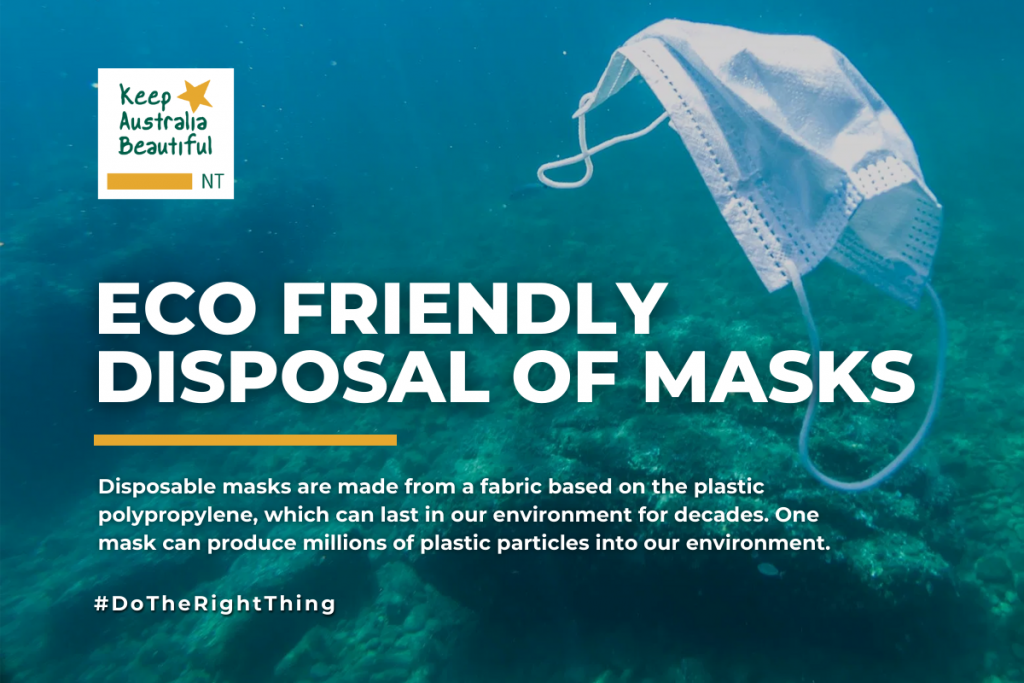The COVID-19 detritus has meant that discarded face masks floating like jelly fish, and gloves lining the seafloor are adding to the world’s plastic waste crisis. Globally, we consume around 129 billion masks every month! Yes, you read that right.

Check out our guide below to Eco Friendly Disposal of these, and other COVID related items.
Single Use Masks
Masks have become essential in fighting the spread of COVID but can pose a serious health and environmental risk if not disposed of correctly. Single-use masks cannot be recycled and must be thrown in the general waste bin.
Environmental scientist Dr Trevor Thornton from Deakin University says waste data is showing an increase in contamination of recycling from people not putting rubbish in the right bin. It means the good work of those recycling the right way is wasted as contaminated recycling loads need to go to landfill.
“Every person and business have a responsibility to do the right thing. Putting masks in recycling not only contaminates recycling, it exposes workers in the sorting facilities to potential virus spread.” Better still, consider using reusable cloth masks to save the disposables ending up in landfill or our oceans.
And always cut the strings of your masks before disposal – so that marine and birdlife don’t become entangled and trapped.
Check out how to make your own cloth mask:
Don’t Flush Tissues
A common misconception is that tissues can be flushed down the toilet. But unlike toilet paper, tissues don’t breakdown in water so can create blockages in plumbing. “People would be very surprised to know that facial tissues, although they are made from fine materials, do not break down and should not be flushed,” says Sydney Water spokesperson Jackson Vernon.
Unfortunately, tissues can’t be recycled either. Dirty ones should be placed in the general waste bin. And of course, always wash your hands thoroughly afterwards.
Wet Wipes
Anti-bacterial wipes are hygiene items we’re using more of to prevent the spread of COVID. But, they’re another item we need to dispose of thoughtfully to avoid harm to our health and our environment.
Wet wipes must be thrown in the general waste bin. Just like tissues, they can’t be recycled and definitely not flushed down the toilet.
According to Power Water, even wet wipes marketed as “flushable” can create big problems with water management.
‘Flushable’ wet wipes may clear your toilet bowl; however, they do not break down quickly enough for our wastewater system. Power and Water Corporation is reminding the community that flushing anything other than the three Ps – poo, pee and toilet paper – could result in sewage overflows in their homes.
Alternative: opt for hand sanitiser if out and about. And, try reusable cloth wipes with anti-bacterial gels when at home.
- https://www.powerwater.com.au/customers/water-and-wastewater/only-flush-the-3Ps
- https://www.powerwater.com.au/about/news-and-media/media-releases/2020/putting-wipes-down-the-pipes-could-leave-you-seeing-brown
Disposable Gloves
Disposable gloves are another item with skyrocketing sales throughout the COVID pandemic.
While they’re necessary in helping keep our community safe, latex gloves can cause a world of harm to our environment if they end up as litter. Similar to balloons, gloves that end up in the environment can be eaten by wildlife like birds and turtles. Contaminated gloves as litter also represent a health risk to people that have to pick them up.
So please remember, dispose of gloves in the general waste bin – not the recycling.
For more tips on how to safely dispose of your used gloves, check out:
Takeaway Containers
Feeling like a Friday night takeaway treat? Takeaway food sales have seen a big spike during the pandemic as restaurants provide an alternative to dine-in options. So, it’s a good time to remember how to dispose of takeaway packaging responsibly.
- Plastic containers – reuse them as many times as you can, then throw them in the plastic recycling bin. Make sure they’re clean first!
- Cardboard – pizza boxes can be recycled but only if they’re clean. If they are, tear off the top and just recycle it.
- Soft plastics – plastic wrapping from takeaway can be taken back to your local supermarket for recycling.
- Styrofoam – avoid this as best you can as it cannot be recycled so must go in the general waste bin.
- Cutlery (Plastic or Compostable) – please do not litter and place in appropriate bins, use compostable cutlery or better yet, use cutlery from home
Hand Sanitiser Bottles
Hand sanitiser is another must-have item of 2021. Pocket size versions are great when you’re on-the-go but don’t last very long.
So, why not buy in bulk and refill your travel-sized sanitiser? It’s cost effective and reduces plastic waste from ending up in landfill or potentially littering out beautiful country. When it comes time to dispose of the bulk sanitiser bottle, it can be recycled in your plastic recycling bin.
Takeaway Cups
Are you waking up to a café coffee this Sunday morning?
More than a billion cups are sent to Australian landfill every year. With many cafes no longer accepting reusable coffee cups due to the risk of COVID, single-use cups are on the rise.
Good news is you can recycle takeaway coffee cups at 7-Eleven, via Simply Cups. Any brand of coffee cups is accepted, and both cups and lid are upcycled into new products.
Simply Cups has diverted more than 12 million cups from landfill in just a few years, and is supported by many of Australia’s largest coffee sellers, including 7-Eleven, Muffin Break and The Coffee Club.
HOWEVER , 7-Eleven isn’t in the Northern Territory yet – but we’d like to invite our local coffee shops to accept the challenge – are you up to the task? If so – please get in touch with us, so we can share the available service with our readers.
For more tips or information, please get in touch with us:
- Heimo Schober
- Chief Executive Officer, Keep Australia Beautiful Council NT
- 0407 186 461 | ceo@kabcnt.org.au